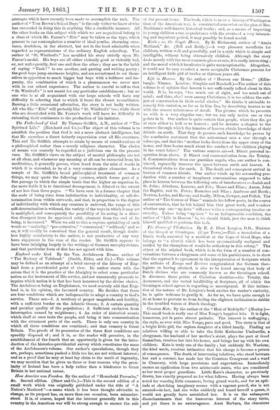The Fatherhood of God. By Thomas Griffith, A.M., author of
"The Spiritual Life." (Hatchard and (Jo.)—The object of this volume is to establish the position that God is not a mere abstract intelligence, but that He exercises a direct fatherly supervision over all His creatures. This end Mr. Griffith attempts to attain by means of considerations of a philosophical rather than a merely religious character. The choice of means can scarcely be regarded as a judicious one in the present case. Mr. Griffith's views on the subject of mental philosophy are not at all clear, and whenever any meaning at all can be extracted from his meditations, it generally proves, when freed from the mist of words in which it is shrouded, to be of a very common-place character. As a sample of Mr. Griffith's broad philosophical treatment of common things, we may quote the following sentence, which forms part of a fine passage in which the simple truth that the higher an organism is, the more liable it is to functional derangement, is diluted to the extent of not less than three pages. "We have seen in a former chapter that the scale of being rises from indistinction to individuality, or sell-de- termination from within outwards, and that, in proportion to the degree of individuality with which any creature is endowed, the range of this self-determination is widened, the variety of the ways in which it may act is multiplied, and consequently the possibility of its acting in a direc- tion divergent from its appointed orbit, aberrant from the end of its being, is increased." When we add to this a copious sprinkling of such words as " multeity," "pre-actnative," " concreated," "selfhood," and so on, it will readily be conceived that the general result, though doubt- less highly satisfactory to the author, is not productive of any very keen enjoyment in the case of the reader. Mr. Griffith appears to have been indulging largely in the writings of German metaphysicians, and that particular form of diet has not agreed with him.






























 Previous page
Previous page